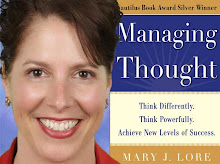In my last blog on Choosing and Experiencing Happiness, I talked about the difference between emotional happiness and true happiness. I had the opportunity to really experience this last week when my father nearly died.
In my workshops, I ask folks to notice what happens as we listen to the songs Happy Birthday, Taps, Auld Lang Syne, and The Wedding March. We all experience a series of thoughts and feelings, and the happy or unhappy emotions that follow depending on the thoughts. Yet nothing has really happened to us. We’re just sitting there listening to a set of songs. If we are not aware, we mask our true nature, the state of being—true happiness—that is always present, no matter what the external circumstances. We say we’re happy or unhappy, when all that has happened is our brains have presented to us the thoughts and feelings we had when we heard those songs before.
When I practice self-awareness, I look AT the thoughts and feelings presented to me by my brain, instead of FROM them and I discover that I can experience sadness, grief, anger, and other “unhappy” emotions AND at the same time, I can remain truly happy.
Let’s take my experience last week: I phoned my father. He was incoherent. I dropped everything to go to my parent’s house. During my half-hour drive, my brain presented me with numerous thoughts: This could be it! Dad could die today. How could Mom (who is suffering from dementia) not notice that he was incoherent? What if I hadn’t called? What if I wasn’t in town? What am I going to do with Mom?
I also had thoughts of anger at my mom for having dementia and at my dad for not making the decision to move into a senior community where he could have care for her and he could get some rest, have some peace of mind, and have a life. I found my breathing shallow, my heart racing, my jaw and hands clenched.
The essence of every thought is either love or fear. Those rooted in love emanate from and result in true happiness. Those rooted in fear result in emotional unhappiness or short-lived emotional happiness. Looking AT my thoughts, I could see that my brain was presenting me with fight, flight or freeze thoughts—fear, blame, judgment, criticism, worry—all fear-based thoughts that result in emotional unhappiness.
I set my intention: I choose love.
I began thinking thoughts of thankfulness: I am thankful I call Dad every day. I am thankful he answered the phone. I am thankful I am in town and can be there for my parents. I am thankful we have access to great medical care. I am thankful my parents and I have a great relationship, that we have had the opportunity to spend quality time with each other and that we enjoy each other’s company.
Then thoughts of wonder: What can I say or do right now that’s of highest service? How can I help my parents and me? And then ideas came rushing through – Call Dad’s doctor. Ask for advice to help Dad given various scenarios. Ask for referrals on nursing aids for my mom. Remain calm. Help Mom and Dad feel safe. Demonstrate love in every action. Love and trust the flow and process of life.
With these thoughts, I moved out of fight, flight, or freeze and back in touch with the truly happy me. I like to follow the example of the Great Lakes—while the surface of the waters can become rough and excited, deep down, it is very still. So over the course of the next week, although the circumstances were difficult, I could remain in a powerful place. I could experience a number of “unhappy” emotions, feel them (not suppress them), acknowledge them, thank my brain for sharing, and then choose thoughts which move me in a direction that truly serves my purpose, bring me peace, inspire me, and invoke true happiness.
P.S. My Dad’s now better than well and my Mom is doing fine.
©2010 Managing Thought. All rights reserved.
For more on this topic and how to manage your thoughts in everyday circumstances and how to deal with the challenges you face in practicing self-awareness and being on purpose, Click Here.
Wednesday, October 6, 2010
Subscribe to:
Posts (Atom)

